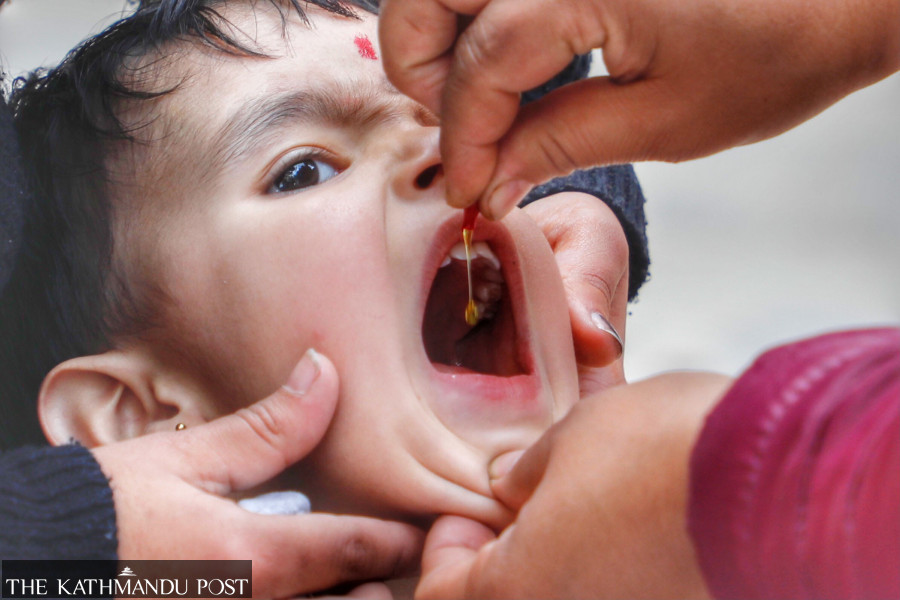Health
Government received 2 million doses of vitamin A capsules, therapeutic milk from UNICEF last month
Fear of CIAA scrutiny deters officials from purchasing essential medicines and commodities at a higher price. Officials say that the cost of most medicines and commodities has risen internationally due to the rise in the US dollar price.
Arjun Poudel
With all its efforts failed to purchase Vitamin A capsules on time, the Ministry of Health and Population has received two million capsules of the micronutrient from the United Nations Children’s Fund (UNICEF).
Those capsules were used in the nationwide vitamin A supplementation campaign held on April 19 and 20.
In addition to the Vitamin A capsules, the Health Ministry also got therapeutic milk sufficient for at least six months to treat severely acute malnourished children.
“We couldn't purchase vitamin A capsules and therapeutic milk required for the treatment of severely malnourished children on time,” said Lila Bikram Thapa, chief of Nutrition Section at the Family Welfare Division under the Department of Health Services. “We continued the planned campaign with the help of the UN body, but the problems that deter officials from purchasing those essential medicines and commodities still exist. We cannot repeatedly request aid agencies for essential health commodities.”
Vitamin A capsules and therapeutic milk are among the multiple commodities the Health Ministry lacked due to a failure to purchase them on time. The reason is the rise in the US dollar price, and fear of scrutiny of the Commission for Investigation of Abuse of Authority (CIAA), which deters officials from purchasing essential medicines and commodities at a higher price.
Officials concede that state-run health facilities across the country have run out of iron and folic acid tablets, depriving hundreds of thousands of pregnant women, new mothers, and girls between 10 and 19 of them. The free iron and folic acid supplementation programme, which was initiated to reduce the high prevalence of anaemia among adolescent girls, pregnant women, and new mothers, has stalled.
Similarly, health facilities also lacked various family planning means.
“We all know the US dollar price has risen in recent years and our budget has not risen accordingly,” said Dr Bibek Kumar Lal, director at the Family Welfare Division. “And our Public Procurement Act also does not allow us to pay a higher price than what was paid earlier. So, officials don’t want to take the risk of scrutiny from the CIAA. ”
Health officials say that aid agencies, including UN agencies, do not provide essential commodities and medicines every time the government asks, and the trend of not purchasing those items due to fear of being investigated by the CIAA or other agencies risks a nationwide shortage.
“We have been investing huge resources—both financial and human—in the health care sectors for years, which has also yielded positive results,” said Lal. “Disruptions in the programmes and services will have long-term consequences, and the progress we made over the years will be jeopardised.”
The Vitamin A capsule was used in the two-day campaign launched on April 19 and 20. Around 2.3 million children between six and 59 months across the country were administered vitamin A supplements. Of them, around 2.1 million children between 12 months to 59 months were also administered deworming tablets.
The Health Ministry has been conducting the campaign twice a year—in April and October—since 2003.
Officials say that vitamin A supplementation and a deworming tablet administration campaigns are crucial in preventing many childhood diseases and reducing mortality among children under five.
It is because of supplementation campaigns like these that night blindness among children, which used to be very high until two decades ago, has been almost eliminated, according to Thapa.
Vitamin A deficiency is estimated to contribute to nearly one-fourth of global child mortality from measles, diarrhoea and malaria.
The campaign is a success story in Nepal, as it has helped address vitamin A deficiency among children, which used to be a major public health problem in the country. Regular supplementation campaigns are estimated to have reduced deaths among children under five by 23 percent.
Deworming tablets are crucial to preventing many childhood diseases and reducing the mortality rate among children under five, according to child health experts.
The vitamin A supplementation and the deworming campaign had coverage rates of over 94 percent, the highest among all health campaigns run in the country in the past. However, the coverage declined to just over 80 percent in recent years.
Child health experts say that vitamin A supplementation campaigns are important for children's overall growth and for protecting them from various infectious diseases.
According to the World Health Organisation, vitamin A deficiency causes visual impairment (night blindness) and vulnerability to illnesses like measles and diarrhoea among children. The supplement boosts immunity and ensures children’s natural growth.




 14.12°C Kathmandu
14.12°C Kathmandu















